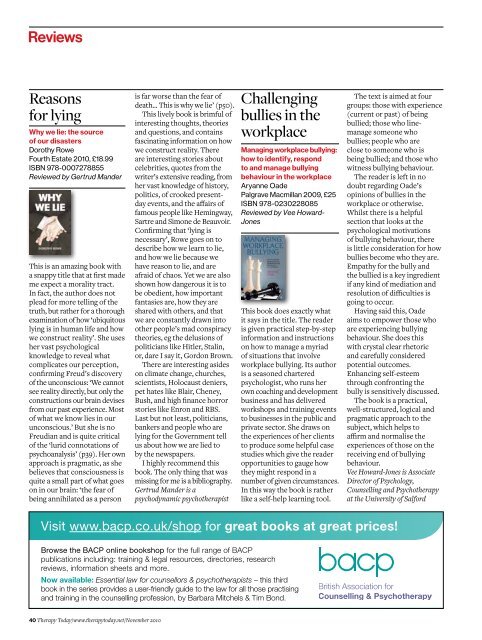Therapy Today
15301_november%202010
15301_november%202010
Create successful ePaper yourself
Turn your PDF publications into a flip-book with our unique Google optimized e-Paper software.
Reviews<br />
Reasons<br />
for lying<br />
Why we lie: the source<br />
of our disasters<br />
Dorothy Rowe<br />
Fourth Estate 2010, £18.99<br />
ISBN 978-0007278855<br />
Reviewed by Gertrud Mander<br />
This is an amazing book with<br />
a snappy title that at first made<br />
me expect a morality tract.<br />
In fact, the author does not<br />
plead for more telling of the<br />
truth, but rather for a thorough<br />
examination of how ‘ubiquitous<br />
lying is in human life and how<br />
we construct reality’. She uses<br />
her vast psychological<br />
knowledge to reveal what<br />
complicates our perception,<br />
confirming Freud’s discovery<br />
of the unconscious: ‘We cannot<br />
see reality directly, but only the<br />
constructions our brain devises<br />
from our past experience. Most<br />
of what we know lies in our<br />
unconscious.’ But she is no<br />
Freudian and is quite critical<br />
of the ‘lurid connotations of<br />
psychoanalysis’ (p39). Her own<br />
approach is pragmatic, as she<br />
believes that consciousness is<br />
quite a small part of what goes<br />
on in our brain: ‘the fear of<br />
being annihilated as a person<br />
is far worse than the fear of<br />
death... This is why we lie’ (p50).<br />
This lively book is brimful of<br />
interesting thoughts, theories<br />
and questions, and contains<br />
fascinating information on how<br />
we construct reality. There<br />
are interesting stories about<br />
celebrities, quotes from the<br />
writer’s extensive reading, from<br />
her vast knowledge of history,<br />
politics, of crooked presentday<br />
events, and the affairs of<br />
famous people like Hemingway,<br />
Sartre and Simone de Beauvoir.<br />
Confirming that ‘lying is<br />
necessary’, Rowe goes on to<br />
describe how we learn to lie,<br />
and how we lie because we<br />
have reason to lie, and are<br />
afraid of chaos. Yet we are also<br />
shown how dangerous it is to<br />
be obedient, how important<br />
fantasies are, how they are<br />
shared with others, and that<br />
we are constantly drawn into<br />
other people’s mad conspiracy<br />
theories, eg the delusions of<br />
politicians like Hitler, Stalin,<br />
or, dare I say it, Gordon Brown.<br />
There are interesting asides<br />
on climate change, churches,<br />
scientists, Holocaust deniers,<br />
pet hates like Blair, Cheney,<br />
Bush, and high finance horror<br />
stories like Enron and RBS.<br />
Last but not least, politicians,<br />
bankers and people who are<br />
lying for the Government tell<br />
us about how we are lied to<br />
by the newspapers.<br />
I highly recommend this<br />
book. The only thing that was<br />
missing for me is a bibliography.<br />
Gertrud Mander is a<br />
psychodynamic psychotherapist<br />
Challenging<br />
bullies in the<br />
workplace<br />
Managing workplace bullying:<br />
how to identify, respond<br />
to and manage bullying<br />
behaviour in the workplace<br />
Aryanne Oade<br />
Palgrave Macmillan 2009, £25<br />
ISBN 978-0230228085<br />
Reviewed by Vee Howard-<br />
Jones<br />
This book does exactly what<br />
it says in the title. The reader<br />
is given practical step-by-step<br />
information and instructions<br />
on how to manage a myriad<br />
of situations that involve<br />
workplace bullying. Its author<br />
is a seasoned chartered<br />
psychologist, who runs her<br />
own coaching and development<br />
business and has delivered<br />
workshops and training events<br />
to businesses in the public and<br />
private sector. She draws on<br />
the experiences of her clients<br />
to produce some helpful case<br />
studies which give the reader<br />
opportunities to gauge how<br />
they might respond in a<br />
number of given circumstances.<br />
In this way the book is rather<br />
like a self-help learning tool.<br />
The text is aimed at four<br />
groups: those with experience<br />
(current or past) of being<br />
bullied; those who linemanage<br />
someone who<br />
bullies; people who are<br />
close to someone who is<br />
being bullied; and those who<br />
witness bullying behaviour.<br />
The reader is left in no<br />
doubt regarding Oade’s<br />
opinions of bullies in the<br />
workplace or otherwise.<br />
Whilst there is a helpful<br />
section that looks at the<br />
psychological motivations<br />
of bullying behaviour, there<br />
is little consideration for how<br />
bullies become who they are.<br />
Empathy for the bully and<br />
the bullied is a key ingredient<br />
if any kind of mediation and<br />
resolution of difficulties is<br />
going to occur.<br />
Having said this, Oade<br />
aims to empower those who<br />
are experiencing bullying<br />
behaviour. She does this<br />
with crystal clear rhetoric<br />
and carefully considered<br />
potential outcomes.<br />
Enhancing self-esteem<br />
through confronting the<br />
bully is sensitively discussed.<br />
The book is a practical,<br />
well-structured, logical and<br />
pragmatic approach to the<br />
subject, which helps to<br />
affirm and normalise the<br />
experiences of those on the<br />
receiving end of bullying<br />
behaviour.<br />
Vee Howard-Jones is Associate<br />
Director of Psychology,<br />
Counselling and Psychotherapy<br />
at the University of Salford<br />
Visit www.bacp.co.uk/shop for great books at great prices!<br />
Browse the BACP online bookshop for the full range of BACP<br />
publications including: training & legal resources, directories, research<br />
reviews, information sheets and more.<br />
Now available: Essential law for counsellors & psychotherapists – this third<br />
book in the series provides a user-friendly guide to the law for all those practising<br />
and training in the counselling profession, by Barbara Mitchels & Tim Bond.<br />
40 <strong>Therapy</strong> <strong>Today</strong>/www.therapytoday.net/November 2010


